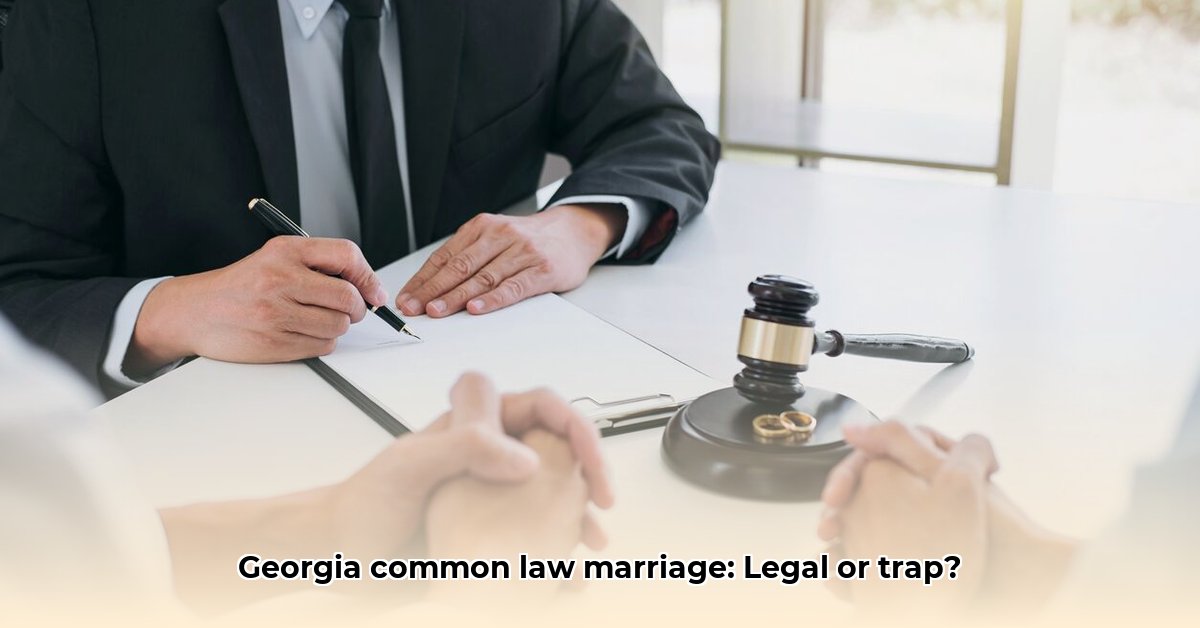
Understanding the legality of common-law marriage in Georgia requires navigating a complex legal landscape shaped by historical precedent and statutory changes. While new common-law marriages are no longer recognized, existing unions formed before 1997 or legally established in other states may still hold legal weight. This guide provides crucial information for individuals seeking clarity on their rights and responsibilities.
Is Common Law Marriage Legal in Georgia? A Historical Overview
Georgia's stance on common-law marriage has shifted significantly over time. While the state previously recognized informal marriages, a 1997 law effectively ended the creation of new common-law unions. This change aimed to reduce legal ambiguity and potential disputes surrounding marital status and asset division. However, the legal ramifications for pre-existing unions remain relevant. Understanding this historical context is key for anyone considering the implications of common-law marriage in Georgia.
What is Common-Law Marriage?
Common-law marriage, also known as informal marriage, refers to a relationship where two individuals live together, present themselves publicly as husband and wife, and intend to be married, without obtaining a marriage license or having a formal ceremony. Unlike formal marriages, the validity hinges on demonstrating a mutual agreement and consistent behavior indicative of a marital relationship. Is this a path you'd genuinely consider?
Georgia's Pre-1997 Common-Law Marriages
Common-law marriages established before January 1, 1997, remain legally valid in Georgia. These relationships are subject to the laws in effect at the time of their formation. Consequently, asset division and inheritance rights differ from those governing formal marriages established under current law. This historical distinction is a crucial factor in understanding the implications of existing common-law unions. Do you have questions about property rights in a pre-1997 common-law marriage?
The Impact of the 1997 Legislation
The 1997 legislation prohibiting the formation of new common-law marriages aimed to establish greater clarity in marital status. The change simplified the process of determining marital relationships and reduced the potential for legal disputes arising from ambiguous situations. Since this date, Georgia has required formal marriage licenses and ceremonies for legally recognized marriages. What are the implications for couples who entered relationships believing they were common-law married after January 1st, 1997?
Out-of-State Common-Law Marriages
The "Full Faith and Credit Clause" of the U.S. Constitution mandates that Georgia recognize common-law marriages legally formed in other states that permit them. However, this doesn't automatically equate to identical legal treatment under Georgia law. Understanding the potential complexities requires careful consideration of the laws of both the state where the marriage was formed and the laws of Georgia. How does Georgia handle inheritance matters in out-of-state common-law marriages?
Proving a Common-Law Marriage in Georgia: Evidence and Procedures
Proving a valid common-law marriage in Georgia, whether pre-1997 or from another state, necessitates compelling evidence. The court will carefully assess the facts to ascertain the existence of a genuine marital relationship. A lawyer specializing in family law who understands Georgia's regulations on this matter, can help you navigate this process.
Essential Elements of Proof
To successfully establish a common-law marriage, you must demonstrate:
- Present Intent to be Married: Evidence of a mutual agreement to be married, even in the absence of a formal ceremony. This might include witness testimony, letters, or emails expressing a commitment to marriage.
- Cohabitation: Proof of living together as husband and wife, including shared residences and joint living expenses. Financial records such as joint bank accounts or tax returns can help here.
- Public Representation: Demonstrating that the couple presented themselves publicly as husband and wife, such as through introductions to family and friends, joint social media presence, or other similar actions.
Gathering Evidence: A Critical Step
Gathering comprehensive evidence is paramount to successfully proving a common-law marriage. This may include:
- Witness Testimony: Statements from individuals who observed the couple living together and presenting themselves as married.
- Financial Records: Joint bank accounts, tax returns, insurance policies, or property deeds showing joint ownership.
- Photographs and Videos: Visual evidence depicting the couple together at various events or locations.
- Correspondence: Emails, letters, or other communications that demonstrate the couple's commitment to each other.
The Importance of Legal Counsel
Navigating the legal complexities of proving a common-law marriage is exceptionally challenging. The evidentiary requirements are strict, and the potential consequences for failure are significant. Engaging a qualified family law attorney is highly recommended to protect your interests and maximize your chances of success.
Frequently Asked Questions (FAQs)
Q: Can I enter a new common-law marriage in Georgia? A: No. Georgia abolished the creation of new common-law marriages in 1997.
Q: My parents were in a common-law marriage before 1997. What are their rights? A: Their marriage is legally recognized, but their rights regarding property division and inheritance are governed by the laws in effect at the time of their union. Seek legal counsel for specific guidance.
Q: My common-law marriage was valid in another state. Does it hold in Georgia? A: Yes, provided it met the requirements of the state where it originated; however, specific legal advice is needed to fully understand its implications within Georgia.
This information is for educational purposes only and does not constitute legal advice. Consult with a qualified attorney for advice tailored to your specific circumstances.